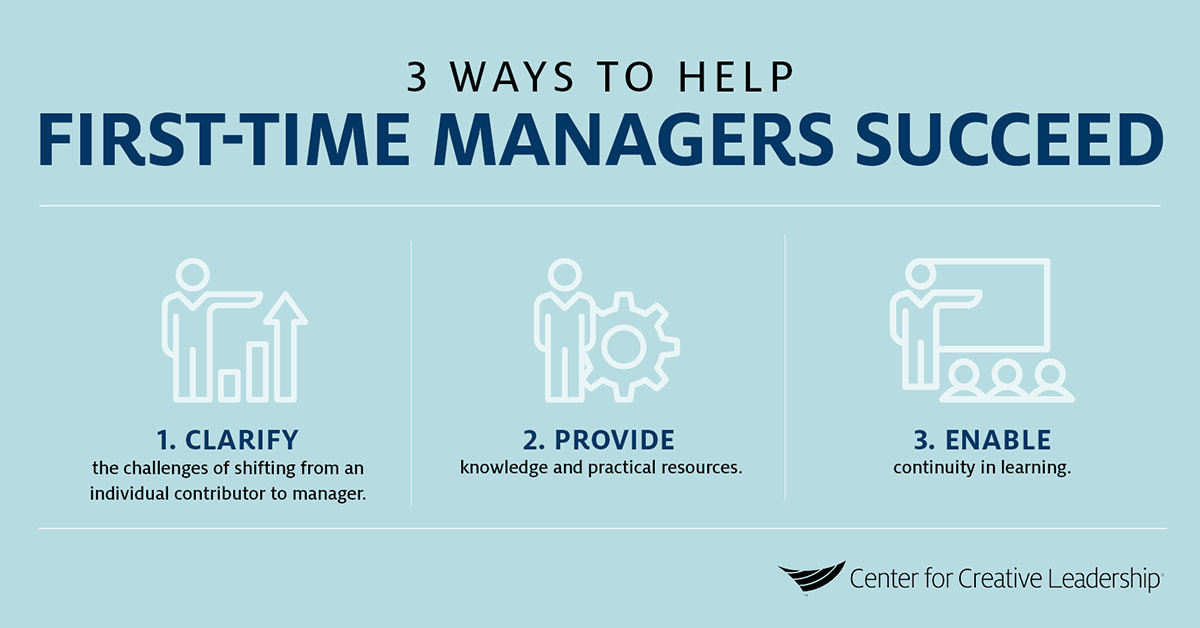Developing New Managers Into Leaders
“Before my promotion, I was a good-to-excellent chemist. Now, I’m only an okay chemist and an okay manager.”
That’s how one first-time manager described the letdown of being promoted from individual contributor to being a formal team leader. She’s finding that the skills and attributes that made her successful before aren’t very helpful for leading others, and she isn’t sure what to do differently.
Another recently promoted manager is now responsible for direct reports who used to be his peers. Making the transition from friend to boss is proving harder than he expected, he told us.
Both these scenarios are understandable, as they’re among the most common challenges for first-time managers. Far too often, the new leader and their organization take for granted just how difficult it can be to transition from technical or functional expert to a leader of people.
The numbers prove it:
- 20% of first-time managers are doing a poor job, according to their subordinates.
- 26% of first-time managers felt they were not ready to lead others to begin with.
- Almost 60% said they never received any training when they transitioned into their first leadership role.
No wonder 50% of managers in organizations are rated as ineffective.
Senior leaders and talent professionals know a frontline management role can be tough. They see new managers falter — or fail. Without an attentive boss and supportive organization, first-time managers are on their own. Some figure it out, but many don’t.
What can organizations — and senior leaders — do to strengthen their leadership pipeline by developing new managers?
What Matters Most When Developing New Leaders?
3 Research-Backed Ways to Help Your First-Time Managers Succeed
Based on our decades of research and experience developing first-level managers, we suggest 3 key things to increase their chances of success:
1. Clarify the challenges of shifting from individual contributor to manager and acknowledge their reality.
Help new managers to anticipate challenges and understand the learning curve is natural. Being the boss of people who were your peers is often a difficult change. Leading a team; engaging, motivating, and coaching others; building relationships; and finding constructive responses to conflict are among the specific challenges that new managers face.
Many first-time managers feel alone, as if they’re the only ones to struggle with taking on a management role. They’re probably too self-conscious to admit they’re having a hard time, as if that would prove they didn’t deserve the promotion.
When new managers attend our programs for developing new leaders, they often tell us they’re surprised — and relieved — to learn that the issues they’re facing are actually quite common and that their peers face many of the same problems.
Support them. Developing new leaders means helping them make an identity shift away from the mindset that success is all about their individual contributions. The new reality is that their success is about working with, and through, others. Communicate with new managers and give them feedback on how they’re doing. Let them know they’re doing important work and give formal recognition when they do well.
This type of support does make a difference: Our research shows that when people feel supported, they’re less likely to want to leave and have higher job satisfaction and commitment. Providing organizational scaffolding and boss support is critical.
2. Provide new managers with knowledge and practical tools, tailoring development to specific areas of need.
You want to develop leaders, not just bosses, so helping new managers understand the new mindset and behaviors they need in their role is essential. Training specifically tailored to the challenges of first-level management can help. New managers may know they need to communicate or give feedback to direct reports — but what they’re doing may not be working. Trying new approaches rather than relying on what seems most obvious or easy is the only way to change and improve.
When you provide access to leadership development to your first-time leaders (whether in-house or through external partners), be sure the content is relevant to them, and not generic, to help develop their core leadership skills and understand the different leadership roles they must be able to play.
Developing new managers also means equipping them with a clear picture of their current leadership style, strengths, and weaknesses. We believe that one of the key principles to help accelerate leader development is being deliberate about providing experiences tailored to an individual’s most pressing development needs. So, help new managers develop key leadership competencies needed to succeed — especially the skills that frontline managers need — and consider providing access to 360 feedback to increase self-awareness. (But ensure they approach their assessment data in the right way to make a real and lasting impact.)
Help Your Organization in Developing New Managers
Support your first-time managers as they make the shift from successful individual contributors to truly effective leaders with our proven new leader training courses.
3. Create continuity in learning, helping new managers go beyond the Aha! moment in a one-off training.
We’re always looking for ways to improve learning transfer — the ability to put what’s learned to use. In our programs for developing new leaders, content and activities are tied to real-life needs and valuable skills. We also use processes like goal-setting and action planning, follow-up coaching, online resources, and accountability partners to grow and maintain learning over time.
To further support and develop new managers, consider providing access to ongoing executive coaching and mentoring programs, and ensure new leaders have a boss who’s capable of holding coaching conversations and offering feedback and development.
Create learning networks for first-time managers to further sustain learning. Consider setting up a formal program to create opportunities for first-level managers to share stories of success or failure, talk about what they’ve learned from experience, and be a support system for one another.
If there’s a cadre of willing mentors to support new managers, great. But even if there isn’t a formal mentoring program set up, simply giving time and space for these new leaders to get together and act as peer mentors for each other can go a long way in making them feel supported and valued by the organization.
Developing New Leaders Requires Intentional Effort
One last point: Improving the caliber of leadership on your organization’s front lines requires a commitment and intentional effort. First-level managers are likely your organization’s largest population of leaders, and they lead a majority of people in your organization.
Don’t set them up for failure — make sure you’re being intentional about developing new managers into true leaders.
Ready to Take the Next Step?
Help your organization in developing new leaders. Whether you’re looking for new manager training or executive leadership development, we offer a range of research-based programs and solutions to fit your unique context. Contact us to discuss our leadership programs — from turnkey, scalable virtual courses to co-creating customized learning journeys for your leaders — and let’s explore what would best meet your organization’s needs.










